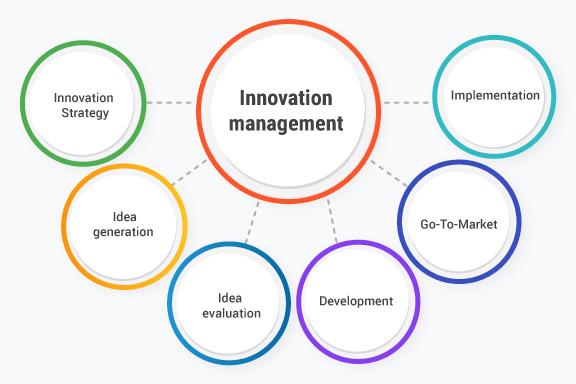Innovation Management Market: A Comprehensive Overview
The innovation management market is a rapidly evolving space that focuses on bringing new ideas to fruition and managing the process of innovation within organizations. This market has gained immense traction due to the increasing need for companies to stay competitive in today's fast-paced technological landscape. Organizations are now prioritizing innovation as a core business strategy, driving the growth of tools and platforms designed to streamline and enhance the innovation process. With the rise of digital transformation, the global Innovation Management Market is expected to grow at a significant rate, providing valuable opportunities for stakeholders.
As businesses face escalating competition and changing consumer expectations, the need for effective innovation management has never been more critical. By facilitating a structured approach to generate, evaluate, and implement innovative ideas, organizations can not only enhance their product offerings but also improve operational efficiencies. The rise of remote work and digital collaboration tools has further empowered teams to innovate regardless of geographical boundaries. The innovation management market is seeing a fusion of traditional methodologies with advanced technologies such as artificial intelligence (AI), machine learning, and big data analytics, enabling businesses to extract valuable insights and make data-driven decisions.
Market Key Players
Several key players dominate the innovation management market, each offering distinct solutions that cater to varying business needs. Notable companies include Brightidea, IdeaScale, Hype Innovation, and Planbox, which provide platforms for idea generation and management. Other significant players such as Qmarkets, Innolytics, and Spigit focus on collaborative tools and analytics capabilities that enhance the innovation process. Furthermore, larger enterprise software companies like SAP and IBM are also entering this market, integrating innovation management features into their broader solutions to provide comprehensive business outcomes. As the competition intensifies, companies are increasingly emphasizing customer experience by optimizing their offerings and providing tailored solutions.
Get a Sample Report + All Related Graphs & Charts:
https://www.marketresearchfuture.com/sample_request/3162
Market Segmentation
The innovation management market can be segmented based on components, deployment types, organization size, verticals, and regions. In terms of components, segmentation includes software and services, where software contributes the majority of the market share due to the high demand for efficient digital platforms. The deployment types are divided between cloud-based and on-premises solutions, with cloud-based solutions witnessing a surge in adoption owing to their scalability and reduced infrastructure costs. Organization size plays a crucial role, with both large enterprises and small-to-medium-sized enterprises (SMEs) implementing innovation management systems to secure competitive advantages across various industries, including IT, healthcare, manufacturing, and retail.
Market Dynamics
The innovation management market is driven by several dynamic factors, including the growing need for competitive differentiation and the rise in investment towards innovation initiatives. As consumers demand constant improvement and personalization, businesses have no choice but to innovate continuously. The advent of start-ups and tech-savvy millennials is further accelerating this trend. However, there are challenges, such as resistance to change and a lack of skilled personnel, which can hinder effective innovation management. Moreover, the market is witnessing increased pressure to comply with regulatory standards and demonstrate return on investment in innovation initiatives, prompting organizations to adopt robust management frameworks.
Recent Development
Recent developments in the innovation management market highlight the integration of emerging technologies that enhance the effectiveness of innovation processes. The use of artificial intelligence and data analytics is shaping how organizations identify trends, evaluate ideas, and predict market responses. AI-driven platforms can analyze vast amounts of data to provide powerful insights, helping companies prioritize their innovation efforts. Additionally, collaboration is becoming increasingly important. As hybrid work environments become the norm, businesses are investing in tools that foster collaborative innovation, ensuring that cross-functional teams can work seamlessly to bring new ideas to market. Recent mergers and acquisitions within this space also point to strategic moves by companies looking to bolster their innovation capabilities and enhance service offerings.
Regional Analysis
Geographically, the innovation management market is segmented into North America, Europe, Asia Pacific, Latin America, and the Middle East and Africa. North America currently holds the largest market share, driven by the strong presence of technology firms and significant investments in research and development. The region is also characterized by high levels of digitalization, enabling companies to implement advanced innovation management solutions effectively. Meanwhile, Europe is gaining momentum due to a focus on sustainability and digital transformation initiatives. The Asia-Pacific region is anticipated to witness significant growth, fueled by increasing urbanization, a booming start-up culture, and rising investments in technology and innovation. Emerging markets in Latin America and the Middle East, and Africa are slowly adopting innovation management strategies, creating opportunities for global players to establish a foothold.
Explore the In-Depth Report Overview:
https://www.marketresearchfuture.com/reports/innovation-management-market-3162
Contact Us:
Market Research Future (Part of Wantstats Research and Media Private Limited)
99 Hudson Street, 5Th Floor
New York, NY 10013
United States of America
+1 628 258 0071 (US)
+44 2035 002 764 (UK)


Warning: Undefined array key "_is_photo" in /home/senmarri/public_html/friend24.in/content/themes/default/templates_compiled/9ea4999d05077b6b690d81624544cd64a51b1299_0.file.__feeds_post.comments.tpl.php on line 27
Warning: Attempt to read property "value" on null in /home/senmarri/public_html/friend24.in/content/themes/default/templates_compiled/9ea4999d05077b6b690d81624544cd64a51b1299_0.file.__feeds_post.comments.tpl.php on line 27
" style="background-image:url(
Warning: Undefined array key "user_picture" in /home/senmarri/public_html/friend24.in/content/themes/default/templates_compiled/19bd7b5d2fc32801d9316dbc2d8c5b25c99e72c3_0.file.__feeds_comment.form.tpl.php on line 31
);">
/home/senmarri/public_html/friend24.in/content/themes/default/templates_compiled/9ea4999d05077b6b690d81624544cd64a51b1299_0.file.__feeds_post.comments.tpl.php on line 128
Warning: Attempt to read property "value" on null in /home/senmarri/public_html/friend24.in/content/themes/default/templates_compiled/9ea4999d05077b6b690d81624544cd64a51b1299_0.file.__feeds_post.comments.tpl.php on line 128
">